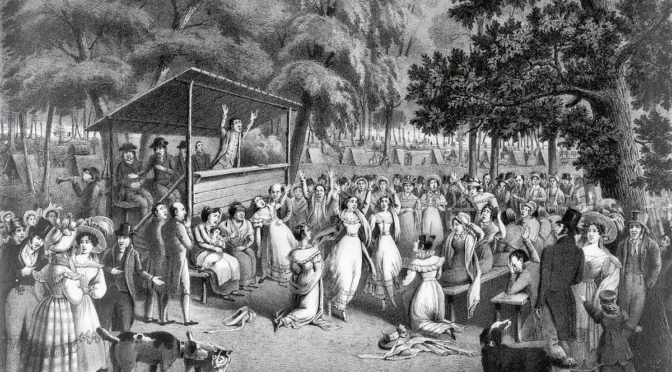The Welsh Revival of 1904–1905 was one of the most extraordinary outpourings of God’s Spirit in modern history. Sparked by the prayers of a small group and the faithful ministry of a young coal miner named Evan Roberts, this revival brought profound spiritual renewal to Wales and beyond. Over 100,000 people came to faith in Christ in just a year during the Welsh Revival 1904–1905, and the movement’s effects are still felt today.
This revival was marked not by elaborate programs or famous speakers but by the undeniable presence of God. It transformed lives, families, and communities, demonstrating the power of prayer, repentance, and God’s sovereign work.
The Birth of Revival: Small Prayers, Big Faith
The Welsh Revival began humbly, with a small group of believers in the village of New Quay, led by a woman named Florrie Evans. In a prayer meeting, Florrie stood and declared, “I love the Lord Jesus with all my heart.” Her testimony of simple, fervent love for Christ stirred others to seek God with greater intensity. This spark spread to nearby towns, where similar gatherings of earnest prayer and worship began to grow.
Meanwhile, Evan Roberts, a 26-year-old coal miner, was praying for revival in his own life. Roberts was consumed by a deep desire to see God move powerfully in his nation. He would often wake in the middle of the night, spending hours in prayer. Roberts later said, “I was led to pray for the Holy Spirit to descend. The Spirit answered and filled me.”
This aligns with the promise in Jeremiah 33:3: “Call to Me and I will answer you, and tell you [and even show you] great and mighty things, things which have been confined and hidden, which you do not know and understand” (AMP). The Welsh Revival was birthed in these hidden places of prayer, as believers cried out for God to reveal His glory.
The Fire of Revival Spreads
In October 1904, Evan Roberts began holding meetings in his home church in Loughor. His messages were simple yet Spirit-filled, emphasizing four key points:
- Confess all known sin.
- Remove anything doubtful from your life.
- Be completely obedient to the Holy Spirit.
- Publicly confess Christ as Savior.
These principles reflect 2 Chronicles 7:14: “If My people, who are called by My name, humble themselves, and pray and seek My face and turn from their wicked ways, then I will hear them from heaven and forgive their sin and heal their land” (AMP).
The meetings quickly gained momentum as people confessed their sins, repented, and surrendered their lives to Christ. Services often lasted for hours, filled with heartfelt prayer, spontaneous singing, and testimonies of transformed lives. No one person led the meetings; instead, the Holy Spirit guided every moment.
Soon, churches across Wales were filled nightly with people seeking God. The revival spread rapidly, touching every corner of the nation. Entire villages experienced a spiritual awakening, with pubs emptying, courtrooms sitting idle, and lives being completely changed.
The Marks of Revival
The Welsh Revival was unique in many ways, marked by several distinct characteristics:
1. A Sense of God’s Presence
The overwhelming theme of the revival was the tangible presence of God. People described an awe-filled awareness of His holiness, which led to deep conviction of sin and a longing for righteousness.
2. Worship and Prayer
Worship was central to the revival, with congregations spontaneously breaking into hymns and prayers. Singing became a hallmark of the movement, often unaccompanied and Spirit-led. Songs like “Here is Love, Vast as the Ocean” became anthems of the revival.
3. Conviction and Repentance
The revival brought a powerful sense of conviction, with people confessing sins publicly and seeking forgiveness. It wasn’t uncommon for individuals to cry out in anguish over their sin before experiencing the peace of salvation.
4. Unity Across Denominations
The revival transcended denominational lines, bringing together Baptists, Methodists, Anglicans, and others in a shared hunger for God. This unity reflected Psalm 133:1: “Behold, how good and how pleasant it is for brothers to dwell together in unity!” (AMP).
5. Social Transformation
The revival had a profound impact on Welsh society. Crime rates dropped dramatically, taverns closed due to lack of business, and long-standing feuds were reconciled. Even miners reported that their workhorses had to relearn commands because the men stopped using profanity.
The Fruits of Revival
By 1905, over 100,000 people had come to faith in Christ. The Welsh Revival didn’t just affect Wales; its influence spread to other nations, igniting revivals in places like India, Korea, and America. Missionary efforts were revitalized, and the movement left a lasting impact on global Christianity.
Evan Roberts eventually stepped back from public ministry, believing that his role was complete. Though the revival’s intensity waned, its fruits continued as countless lives remained transformed, churches were strengthened, and the Gospel spread far and wide.
Lessons from the Welsh Revival
The Welsh Revival offers timeless principles for believers today:
1. Revival Begins with Prayer
It was the prayers of a few faithful individuals that invited God’s Spirit to move. As James 5:16 reminds us, “The heartfelt and persistent prayer of a righteous man (believer) can accomplish much [when put into action and made effective by God—it is dynamic and can have tremendous power]” (AMP).
2. Obedience and Surrender
The revival’s focus on confessing sin and obeying the Holy Spirit shows us the importance of humility and surrender in experiencing God’s presence.
3. Unity and Worship
The revival brought people together in worship, reminding us that revival thrives in a spirit of unity and a shared desire to glorify God.
4. Transformation Beyond the Church
True revival doesn’t end in the church—it impacts society. The Welsh Revival reminds us that when God moves, entire communities are transformed.
A Call for Revival Today
The Welsh Revival shows us that no place, person, or time is too small for God to move. It began with a small group of faithful believers and a young man with a burning heart for prayer. Today, the same God who moved in Wales in 1904 longs to pour out His Spirit on His people.
Prayer for Revival
Lord, we thank You for the testimony of the Welsh Revival and the countless lives transformed by Your Spirit. Stir our hearts to seek You with the same fervency and devotion. Teach us to pray persistently, surrender fully, and trust Your Spirit to lead us. Let revival fire fall on us, transforming our lives, churches, and communities. In Jesus’ name, Amen.
See Also







